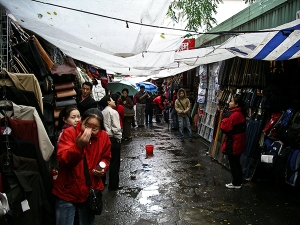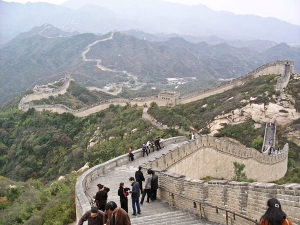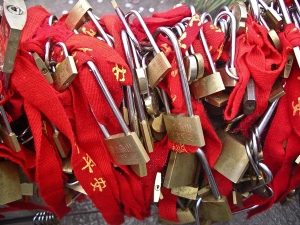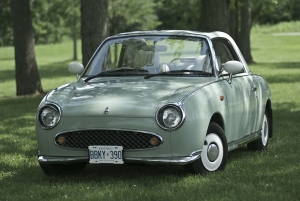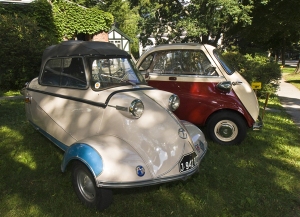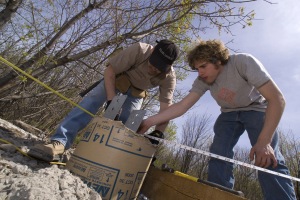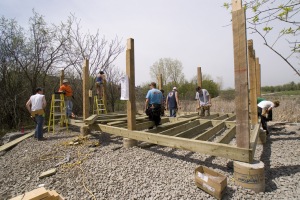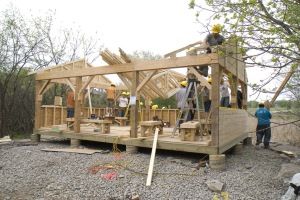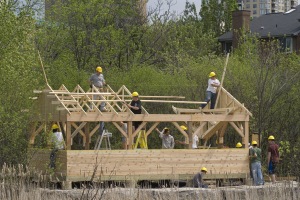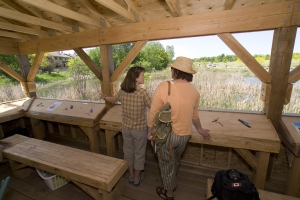Can China lift the Olympic sized smog?
I was blown away by the dark cityscape imagery in Bladerunner, the 1982 movie by Ridley Scott (and one of my favorite movies of all time). It’s one vision of the future world, notably the constant rain and fog and sea of humanity bumping into each other as floating advertisements blare out to the city below. The imagery was brought back home to me when I saw a picture in the Ottawa Citizen newspaper of a couple of people standing a few meters away from the Birds Nest and the Water Cube. The problem was, you could barely see the two normally stunning buildings through the smog. (See a similar picture at Australia’s ABC or at the BBC, also see most recent article on BBC).
Now, smog and air pollution is not just a Beijing phenomenon of course, I remember coming home to my hometown of Windsor Ontario one year and noting the unique electric purple haze at sunset over the cities of Detroit/Windsor. Many city dwellers can relate I am sure. Of course, with the upcoming Olympics in Beijing, a city notorious for its traffic jams of over a million cars a day, we will be deluged with endless reports on air quaility. (I think we will also be amazed at the herculean efforts to curb air pollution the Chinese will be demonstrating). The important lesson for us is: what will the world wide future bring if we can’t breathe the air (or have potable water for that matter), in our spreading urban centers? And, why does the media rarely comment on the real reason for our burgeoning problems of pollution and climate change: an ever increasing and rising population of humans stressing the ecosystem beyond sustainability? How can we adapt to the rising population/shrinking biodiversity systems?
I know the issue is being brought up that “why should the rest of the world have to reduce their footprint when the West has brazenly used up theirs?” Interesting problem. How can we in the West call for others to forgo the trappings of wealth when we have done little to reduce our own? How can we also teach our students to forgo the collecting of material possessions when the previous generation thought little or none about that concept? What do we teach students beyond the usual ‘recycle garbage and turn out the lights’ gig? Can we turn things around and act locally/think globally?
I don’t think it will happen overnight, and I don’t see the hard choices even discussed within the curriculum. Our outdated Industrial Age education system is slow to respond to the acceleration of change so ably described by Alvin Toffler as the future crashing into the present. I haven’t really seen the hard lessons taught yet, though they are trying to tell students to forgo the fries and consider the healthy choices (yet they still offer the fries).
Pretty soon all the talk of climate change and doing piddly little things like recycling and turning out the lights and turning down the thermostat will irritate rather than resonate and just like in the 1970s we will go back to our material consumption ways. Maybe. Maybe disruptive change will force the issue. Who knows? I will be watching the summer Olympics in Beijing with my big screen TV in my air conditioned house while sipping on Mexican beer and cherries from Malaysia.
In the world wide future, we need to talk and teach in every curriculum area about consumption and footprint. Now.
The dragon has awoken
I was invited to go to the People’s Republic of China in 2003 on behalf of the Shandong Press to talk about their proposed textbooks on technology and computer education. It was, to say the least, a life altering experience. China is all about an incredible history, and a story of the future of the world. What happens in China will ripple through the world in unimagined ways. I had told students in my talks on their future, that to take note of the China in the unfolding of the 2008 Olympics, as after many years and decades essentially hidden from western society, the dragon will awaken, and will take it’s place as THE world power of the 21st century.
A country of 1.3 billion people, 20% of the world’s population, which has been steadily tooling up as the world’s manufacturer, now will be demanding a huge share of the world’s wealth as it takes its place on the world stage. I read that by 2012, China will need 110% of today’s oil production just for its own use. Wired Magazine has an interesting article on power requirements for China. Imagine quite a different world wide future than we live in today (only a few years into the 21st century).
The problem with understanding China from here in the West and what it means for the future lies in having our perceptions altered by decades of cold war propaganda. Predictably, every time the media does a story on China they have to invariably mention the events of Tianamen Square of 1989, or their human rights record, etc. etc.. It is a broken record, the same old story endlessly and tiredly repeated. Trouble is, when I was in China in 2003, I got a much different view of an amazing people, with the same ideas and hopes and dreams as we all do. And while yes, China has its own history of human rights abuse (do we talk much about our own work with aboriginals?) it is time to give China a break and really begin to understand the dynamics of this land where everything is of epic proportions. Our understanding of the future relies on understanding the dragon that is China (and the elephant of India which is not far behind).
I had to endure another report from Beijing on the CBC National TV report last night which got my ire up. Of course they had to interview the public in Tianamen Square and ask them about human rights yet again. This ever so dreary man-on-the-street interview report made me write this to them:
*******************************
Give China the benefit of doubt
It is getting very tiresome and predictable to have to listen to yet another commentary about China’s human rights history in a report about the upcoming Olympics (CBC National July 21, 2008). I hope that CBC, like other media, grow up and give us a more modern view of this long-hidden corner of the globe without resorting to the same old rhetoric too often seen through the blinders of western propaganda. Do you dredge up stories of Kent State or Abu Ghraib every time you do a story in Washington? The people of China have been working hard to showcase their amazing history, stunning present and unpredictable future to the rest of the world. As I have witnessed firsthand myself (in 2003), and as your street interviews so clearly illustrate, the Chinese people are among the most friendly, apolitical and eager to please people one can encounter anywhere.
One can only imagine the difficulties of ruling a billion plus people in an area the size of the continental US, or the difficulties of providing a life of freedom and hope for all citizens after so many years of deadly dictatorship. One can also imagine if the results of 1989 Tianamen Square would be much different if it happened instead on the Washington Mall. Mistakes and missteps have happened, and will happen, but it is time to give China what it deserves…time to treat the country with respect and objectivity and perhaps their governing body will be more willing to work with the rest of the world on the issues facing all humanity in the future.
I fervently hope that the Olympics in Beijing runs its course without a hitch, and that the world comes away in awe of this incredible country of 1.3 billion people who collectively have the same hopes and dreams we all do. I also hope that the western media, who come from countries of glass houses, put down their stones and give the People’s Republic of China the chance for respect they deserve without resorting to the same rhetoric of propaganda we have had to put up with for far too long.
***************************
I hope we can get a clearer picture of this incredible country while they put on the quad-annual showcase called the Olympics, though I am not holding my breath for the media to drop its propaganda none too soon. The key to understanding the global future is to understand this part of the world, and the general public needs to have a fair and unbiased view. I have my own little travelogue through some of China in 2003 on my website at www.millenniumwave.com/china/china1.htm. Enjoy!
Zenn and the art of motor vehicle ownership
I just returned from the 13th annual Gould’s Micro Car Classic in Newton Mass., and it was a blast. We drove our 1991 Nissan Figaro down from Ottawa Ontario, about a 7-1/2 drive. My Figaro is not quite a microcar, but it is a minicar, powered by a one litre turbo. The Nissan Figaro was a one-off creation by the Pike Factory, a design division of Nissan, who created four different retro styled vehicles based on the dimunitive Micra platform. I always wanted something unique to drive, and this JDM (Japanese Domestic Market) car is about unique in these here parts as you can get. The looks on people are wonderful to behold, and I have met many people who just have to come by and ask “what is that?!”
Now even though the Figaro is unique, the MicroCar classic is quite a collection of unique vehicles. One has to be amazed at the engineering represented by these vintage cars, typically made from the 1930s up to present day (in the form of the Smart car or Mini-Cooper, though the majority was made from 1930s to 1960s). From Messerschmitts to Bantams to Goggomobiles to Isettas, these cars represent a time where affordability and gas mileage were the critical criteria. Sounds an awful like what we need to consider today. While you can’t say that some of these machines are easy on the environment, I think they do represent the world wide future. Consider…what do we really need to move about town, two tons of steel and a massive V8 engine or a small footprint automobile that gets 50mpg (2l/100km)?
There are many things to consider safety wise but I have a feeling that current regulations represent a massive hurdle to fostering innovation and allow for cheaper and greener alternatives. Consider that here in Canada we have the innovative Zenn Corporation (among others), building all electric vehicles for low speed inner city transportation. However, Transport Canada regulations prevent these from being sold in Canada! They are sold all over the world except for here in our own country. It is time to change regulations and breed innovation, because these times call for new ideas and radical departures from the way things were. The amount of testing that is currently required stops all but big money from getting into the market. Importation rules like an age limit (15 years or older in Canada, 25 years or older in the US for example) needs to change to allow importation of specialty cars (read green cars) for individual use.
I think that the Brand Credo from Zenn says it all:
Since we first began to walk, we have loved the feeling of movement.
To get around and see the world.
To be free.
Cars have given us mobility.
But with the heavy costs of pollution and oil dependency.
ZENN is about returning to the purity of that original feeling.
ZENN may look like a car, but it refuses to act like one.
You’ll experience the simple joy of moving freely.
With silent, exhilarating acceleration
ZENN will quietly change the way you think about getting from A to B.
The air is clean and your conscience is clear.
ZENN is a car that, while it runs on electricity, is fueled by optimism,
The belief that individuals can make a difference,
That we can do better.
ZENN is enlightened mobility
A call to arms perhaps, time for the people to demand that innovation be rewarded, that special rules make it allowable to try greener alternatives. On the education front, it would be ideal if more corporation and government help be offered to high schools and post secondary institutions to help boost engineering projects related to futurethink transportation. There are a number of interesting projects such as solar or electric car races that will no doubt bring some answers to the question of how we will move around in the future.
I have seen the future, and it is smaller.
-M.Scott 2008
Empty Rhetoric and the World Wide Future
Well, I finally heard it today…a candidate for US president, McCain, blab about getting jobs and moving America forward and making America great again. I think George Washington stood on the jobs platform. In the world wide future, will we put up with such empty blitherings from politicians? Same day, the G8 politicos blabbed on about cutting emissions by 2050, which of course by then they won’t be around to care. It is too painful to watch and listen; really hard to contain myself when I hear such automaton thinking and drooling. I really wish we had a watchful media to yell bloody hell when politicians utter such vacuous nonsense, but yet again, it appears no such luck. Does the public really listen and believe this stuff? I would hope not. It is long overdue for the time to end pretend democracy and get on with real public service. Unfortunately, apparently, in the world wide future, no one hears you scream.
We tell our students that to vote is a privilege and a duty, however, I find it hard to reconcile the fact that there usually is no difference between parties, and that party politics (read: special interest groups) trumps public interest too many times. What is missing from the ballot is a “none of the above” option, spoiling a ballot or not voting doesn’t allow one’s dissatisfaction to register. (More on my campaign for “Vote None of the Above” later!) In the world wide future, true democracy can be accomplished by allowing the public to vote on each issue (we have the Internet!) and by calling politicos to task on their promises directly.
It is not enough to teach students to vote, the world wide future requires us to teach them to be proactive on issues that they will face in their lives.
-Michael Scott 2008
EnviroEducation
The world wide future belongs to today’s student who learns through solving tomorrow’s challenges
-Michael Scott 2008
[All photos (c) Michael A. Scott, photowagon.ca 2008]
Site of the Macoun Marsh Biodiversity site, Beechwood Cemetery, Ottawa, Ontario, Canada
The Macoun Marsh project is an excellent example of the WOW! Project…Dream the Impossible, Do the Incredible. We all learn best by doing, by experiencing for ourselves, by taking ownership of our time and efforts. For the full picture story of the construction of the outdoor classroom in the Macoun Marsh Biodiversity Project, go to photowagon.ca under World of Education.
Students become citizens of the future
There is nothing more important to a student’s education than learning through hands-on inquiry about the issues they will face as future citizens.
The issues of ecology, climate change, biodiversity, biotechnology and sustainable development will be at the top of the list of importance in the world wide future of today’s, and tomorrow’s citizens. But are these areas represented in the curriculum? For most jurisdictions, I would hazard to guess: superficially.
Students need to work directly on realistic, wonder inspiring projects (WOW projects!) to learn to survive and thrive in tomorrow’s world. One such project is the Macoun Marsh project in a little corner of Beechwood Cemetery in Ottawa, Ontario, Canada. Under the inspired leadership of elementary school teachers Michael Leveille of St. Laurent Academy, and Clint Monahan of Jean Vanier Catholic School, the students of these schools have identified over 1500 species of plants and animals in a project that lead them to win 2nd place in an international competition sponsored by Volvo Adventure. The monies from the award, and from their subsequent funding drive, paid for the construction of an outdoor classroom, built by a couple of our high schools. Other schools built feeders and bird houses, and future plans were drawn up for a boardwalk, benches and other elements.
Through this project. the students from schools all over the city learned about biodiversity, wetland protection, construction skills and project management. These are lessons for life, it will be something these students will be talking about to their grandchildren. Will they remember their math class?
In 2008, the students and teachers of the project officially partnered with the Canadian Biodiversity Institute and habitat.net to promote and to host the world’s Second Youth Symposium on Biodiversity, in Ottawa in July 2009. As well, the team presented to the United Nations’ Environmental Programme (UNEP) TUNZA in Norway this June 2008. (TUNZA means “to treat with care or affection” in Kiswahili (a sub-regional language of Eastern Africa)
In further news, Clint Monahan has won a 2008 Toyota Prius with his submission to Toyota Canada’s “make things better ” challenge.
The student of today will be the informed citizen (or not) of tomorrow. Our future, our economy, our way of life will be determined by the students who are in our classrooms today. The students of today must be challenged with creating solutions now to prepare them for the world wide future.
Link: The Macoun Marsh Project
Images of the Outdoor Classroom Construction at photowagon.ca
-
Archives
- June 2010 (2)
- October 2009 (1)
- July 2009 (1)
- May 2009 (1)
- January 2009 (2)
- December 2008 (3)
- November 2008 (3)
- October 2008 (1)
- September 2008 (2)
- August 2008 (3)
- July 2008 (6)
- June 2008 (2)
-
Categories
-
RSS
Entries RSS
Comments RSS
